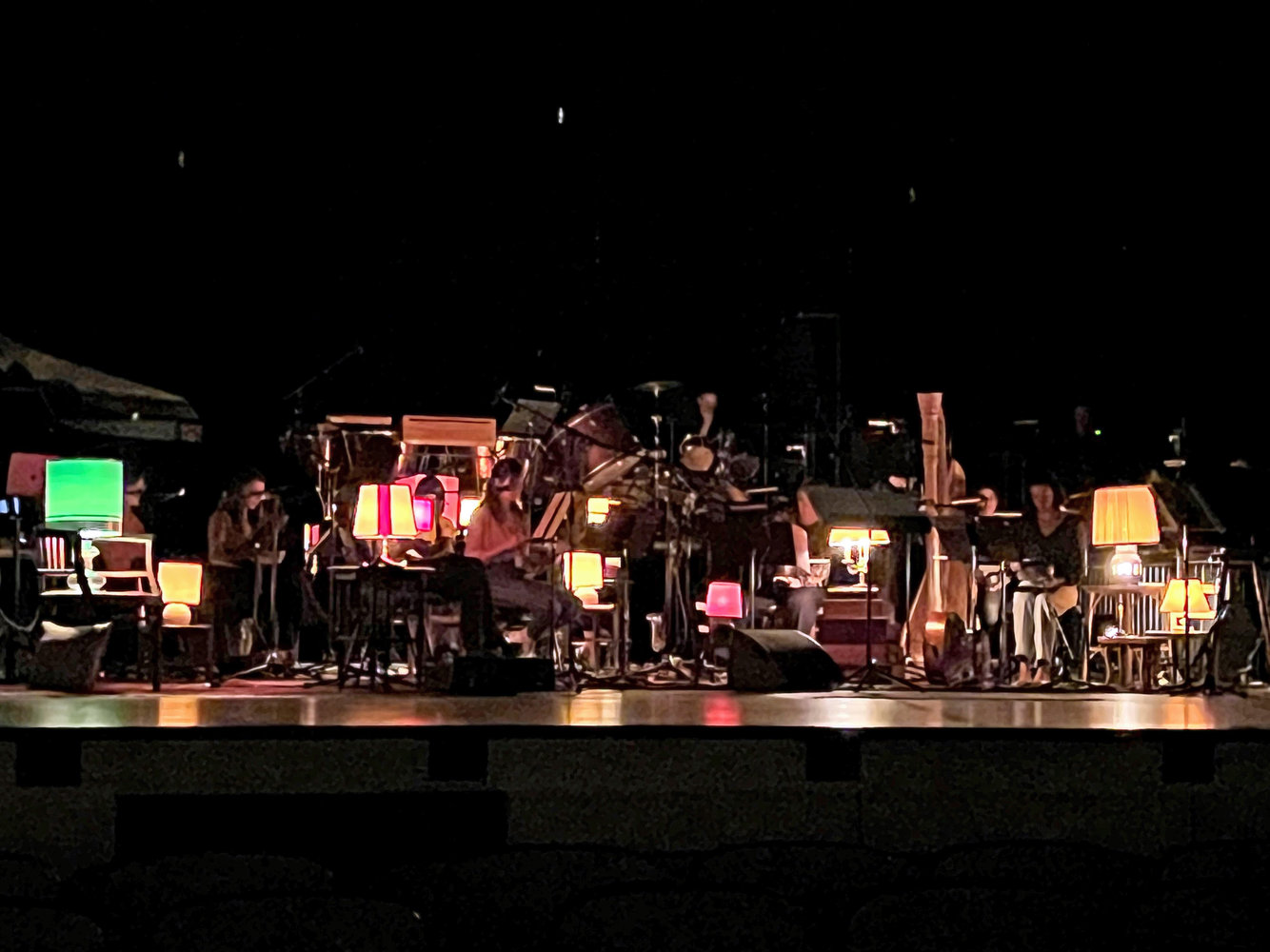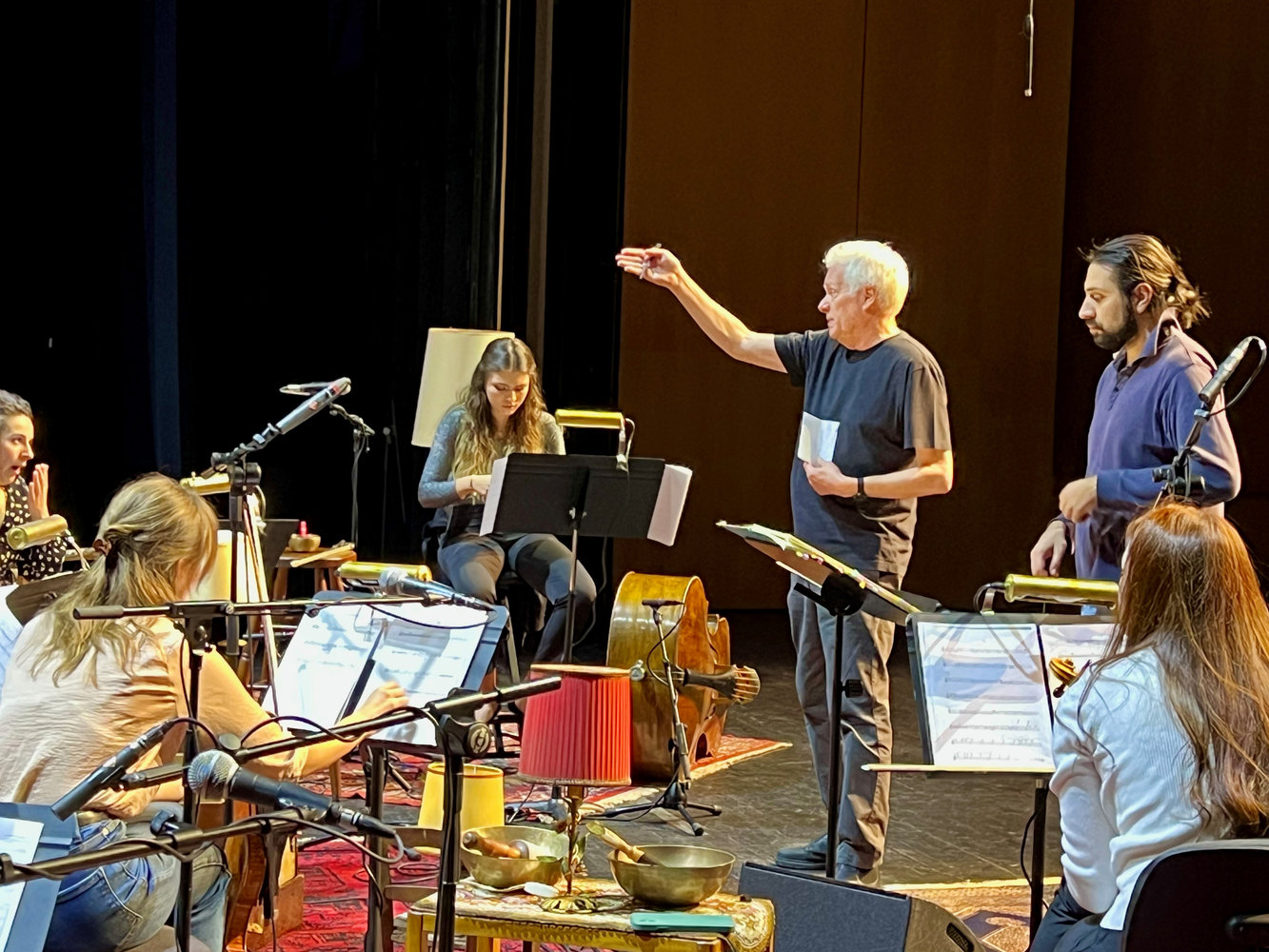Reflecting on the war - "Songs of Wars I Have Seen"
A staged concert by the 900presente orchestra with "Songs of Wars I Have Seen" by Heiner Goebbels in Lugano.

We are in the large hall of the LAC Luganoon the stage the Orchestra 900presente of the Conservatorio della Svizzera italiana with its conductor Francesco Bossaglia. Most of the orchestra members are female, with men only sitting at the back on percussion, harpsichord, trombone and trumpet. Between the players in the foreground there are numerous lamps, as you would find in any household: Floor lamps, bedside lamps, desk lamps and other lamps. Together with the discreet, color-changing stage lighting, this creates an almost private atmosphere, completely atypical for a public concert. And at the end, the lights slowly go out and you sit in the dark.
The dispositive - half music theater, half pure concert performance - is characteristic of what Heiner Goebbels calls a "scenic concert". The lighting he used for his full-length composition Songs of Wars I Have Seen based on texts by Gertrude Stein, is intended, in his words, to create an atmosphere "like an evening reading before you go to bed. You could also play it as a late program at 10 pm." He came to Lugano to attend the final rehearsals with the young performers and is full of praise:
They are very open and extremely grateful and immediately understood how to deal with these texts. For example, the absence of theatricality, which is so important to me. Sometimes you have to push it through against resistance. That was no problem at all here. The collaboration was super pleasant.
The texts by Gertrude Stein are not sung, but spoken by the female members of the orchestra in turn, sometimes in a small choir. The non-theatrical, quasi private speaking and the domestic intimacy of the light sources emphasize the character of the texts as personal notations and lend this scenic concert an air of familiar closeness. But the coziness is deceptive. The texts are about war. The discrepancy between content and form that emerges is rooted in the literary source and is a fundamental aesthetic feature of the work.
The war in your own home
The American Gertrude Stein, writer, publisher and art collector, wrote her notes in 1943-44 in Paris, which was occupied by Nazi troops at the time. The war as a concrete horror is far away, but omnipresent in the writer's consciousness. Her thoughts, written down as if in passing, revolve around everyday experiences. Thoughtfulness is paired with precise observation, uncertain assessment of the situation with literary memories and the feeling of an existential limbo. This rubs off on the music. The transparent and seemingly weightless orchestral writing is thinned out by instrumental solos as an expression of individual reflections and by moments of silence in which the recited texts are embedded. The listener's attention is kept permanently alert. In addition Heiner Goebbels:
Gertrude Stein basically wrote all of this from a private, female perspective, and that is quite provocative. She looks at things from different angles. As a listener, you should also consider this and then decide what your own opinion is. It is a highly subjective text, written in an attempt to put the perception of war into words. And it was precisely this subjectivity that aroused my interest.
Wars I Have Seen, the title of Gertrude Stein's book, refers to the general character of her reflections; it is not about a specific war, but about war as it always was and always will be - an eternal shadow of human existence. Goebbels illustrates this idea in a paradoxical way with a banality. The composition begins with the statement that honey is now added to all desserts due to the lack of sugar, and ends with the assumption that people will have had enough of honey by the end of the war: "That's how it was in the last war, and that's how it is in this war. That's how wars are. Funny, actually. But that's how wars are." A fatalistic tone is unmistakable. But so is her humor.
Appeal to critical reason
Goebbels wrote the piece back in 2007 without any specific external reference, and at the time he could not have imagined that a situation like today would suddenly arise in which it would become topical. Today, he is all the more concerned that the composition does not degenerate into a ritual of consternation. Distance from the text is important to him. He does not want to appeal to emotions, but to critical reason and give room for reflection.
He found access to Gertrude Stein's text not through the content, but through the structure. He was interested in the casual and sketchy nature of the thoughts, and was particularly fascinated by the frequent repetition of individual words and phrases, signs of spontaneous writing. He translated these rhythmic qualities into precisely notated musical structures. Of course, these composed speech rhythms can only be understood in the English original, and by having the text excerpts read by the musicians in their respective mother tongues in Lugano, some of these speech rhythms were lost. Instead, a personal relationship between the speakers and the text came into play. This is entirely in the spirit of the composer, who wants to activate the performers and audience with his pieces.
Dialogue between different layers of time
Several quotations from the English baroque composer Matthew Locke (1621-1677) are incorporated into the musical progression. Goebbels came up with the idea because Gertrude Stein also referred to cruel rulers from Shakespeare's plays such as Richard III. and Macbeth and because the premiere took place in London in 2007. In addition to the London Sinfonietta, the Orchestra of the Age of Enlightenment, which plays on period instruments, also commissioned the work. The latter had Goebbels play in the somewhat lower historical tuning and the Sinfonietta in the modern tuning used today. The confrontation was very much to the composer's taste.
I generally find it interesting when different times are in conversation with each other. Also in Stifter's things For example, there are different layers of time that run in parallel or catch up with each other. I find dealing with the phenomenon of time in this way more exciting than just settling in the here and now.
Since London, Goebbels has repeatedly had two differently tuned orchestras at his disposal, most recently in Stockholm this February. The 900presente orchestra now played in the same tuning and on modern instruments. This did not stand in the way of a successful performance. The work, in which text and music, the inner and outer worlds, scenic elements and different time periods combine to form a multi-layered whole, also found an enthusiastic audience in Lugano.

(Editor's note: The concert took place on April 18, 2023).








